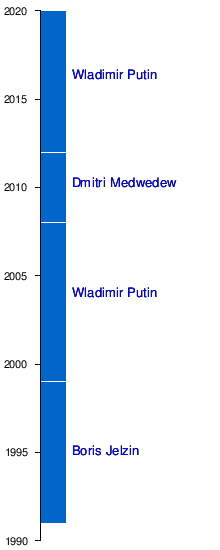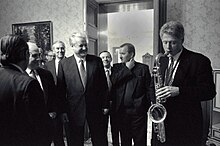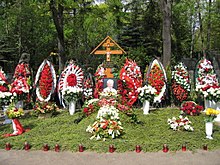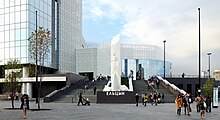Boris Nikolayevich Yeltsin
Boris Nikolajewitsch Jelzin ( Russian Борис Николаевич Ельцин , scientific transliteration Boris Nikolaevič El'cin ; * February 1, 1931 in Butka , Ural Oblast (today Talitsa Rajon , Sverdlovsk Oblast ); † April 23, 2007 in Moscow ) was a Soviet or Russian politician , from 1991 to 1999 he was the first President of Russia . He was also the first democratically elected head of state in Russian history .
Life
origin
|
Boris Jelzin came as the eldest son of Nikolaj Ignatjewitsch Jelzin and Klawdja Wassiljewna, nee. Starygin was born in the village of Butka in the Urals. The parents were farmers and Boris had two younger siblings.
A few years later the family had to move to the city of Berezniki due to economic hardship . To support the family, the father worked as a construction worker while the mother sewed at home at night. Boris also went to school in Berezniki.
Studies and employment, marriage
From 1949 to 1955 Yeltsin studied at the Polytechnic Institute of the Urals in Sverdlovsk and graduated as a civil engineer . He became chief engineer and took over the construction management of the "Jushgorstroi" trust.
In 1956 he married the civil engineer Naina Iossifowna Girina, with whom he had two daughters, Tatjana and Jelena.
Party career
In 1961, Yeltsin became a member of the CPSU , and in 1963 he became head of the Sverdlovsk Housing Combine. From 1976 to 1985 he was the first secretary of the Sverdlovsk regional committee. In 1977, by order of the Moscow Politburo , Yeltsin ordered the destruction of the Ipatiev House , where the last Russian tsar and his family had been killed by the Bolsheviks in 1918 . The Ipatiev House was demolished overnight on July 27, 1977.
Another step in his party career was his election to the Central Committee of the CPSU in 1981 , in which he took over the post of head of the department for building affairs. In October 1985, Yeltsin also became 1st Secretary of the City Committee (party leader) of Moscow and a candidate (non-voting member) of the Politburo . In Moscow he personally campaigned against moving scarce groceries; He put an end to the previously common practice of handing over half-finished tenements to tenants and saved some popular old buildings from the threat of demolition. At the beginning of May 1986, at the DKP party conference in Hamburg, he was the first CPSU politician in the West to report in detail on the Chernobyl nuclear disaster .
He distinguished himself as a radical reformer during perestroika and came into conflict with both Mikhail Gorbachev and with structural conservative forces in the CPSU. Eventually Yeltsin lost his offices. In November 1987 he was replaced as Moscow party leader and released from his duties as a candidate for the Politburo in February 1988. Instead he was 1st Deputy Chairman of the State Building Authority with the rank of Minister until 1989. On the XXVIII. Yeltsin announced his resignation from the party on July 12, 1990 at the CPSU party congress .
democracy
In the first democratic elections in March 1989, Yeltsin became a member of the Congress of People's Deputies of the Soviet Union . In the constituency of Moscow he received 89 percent of the vote. In May 1989, Yeltsin was also elected to the Supreme Soviet of the Soviet Union . There he formed the first parliamentary opposition group with other reform politicians.
On June 12, 1991, Yeltsin was elected President of the Russian Republic ( RSFSR ) in the first Russian presidential election and was instrumental in the dissolution of the Soviet Union. During the August putsch of 1991 against Gorbachev , he took a public position against the coup plotters and holed up in the White House in Moscow, which was successfully defended against attacks by the population. The fall of power of the CPSU and the collapse of the Soviet Union could no longer be stopped. In November 1991, Yeltsin issued a decree banning the party on the territory of the RSFSR. Yeltsin and his counterparts Leonid Kravchuk ( Ukraine ) and Stanislau Schuschkewitsch ( Belarus ) declared after a meeting on December 8th the dissolution of the Soviet Union and its conversion into the Commonwealth of Independent States ; When the agreement came into force at the turn of the year, Yeltsin became the first president of independent Russia. The Parliament of Ukraine had previously stated Ukraine on August 24 independence; in a referendum on December 1, 1991, this found a large majority (for details see History of Ukraine (since 1991) ).
Presidency
In the constitutional crisis of 1993 he dissolved the parliament (Congress of People's Deputies), which had opposed his economic reforms, without a legal basis. Thereupon the parliament relieved Yeltsin of his office and appointed the previous vice-president Ruzkoi as the new president. However, Yeltsin prevailed with the help of the military .
In Russia, Yeltsin is considered to be one of the central figures in coupon privatization in the 1990s. This contributed significantly to the emergence of the post-Soviet oligarchy .
During his reign, Russia fell into a deep economic crisis , and during his tenure, Russia's gross national income was halved . Regardless of the domestic political problems, Yeltsin was the first Russian president to take part in the G-7 summit of the western industrialized nations on July 8, 1994 in Naples. The economic misery continued, partly due to the drop in crude oil prices during the Asian crisis (1997/1998). Russia was insolvent on August 17, 1998, and even the balances in private accounts were frozen.
The First Chechen War (1994 to 1996) also fell during Yeltsin's tenure .
There were rumors of Yeltsin's alcoholism throughout his tenure. For example, Yeltsin conducted an orchestra for the withdrawal of Russian troops from Germany while heavily drunk and also appeared drunk at public election campaigns.
Yeltsin announced his resignation on December 31, 1999, handing over the business of government to Prime Minister Vladimir Putin at 12 noon Moscow time . One of Putin's first official acts then guaranteed Yeltsin freedom from prosecution.
Late years
Yeltsin's health had been in bad shape since the end of his term as Russian President. Several heart attacks had made bypass operations necessary in the 1990s .
Death and burial
Yeltsin died of heart failure at 3:45 p.m. on the afternoon of April 23, 2007 in Moscow's Government Hospital . More than 25,000 mourners passed his coffin, which was laid out in the Russian Orthodox Cathedral of Christ the Savior in Moscow, and paid their last respects to the dead.
The Requiem was held on April 25, 2007 in the Cathedral of Christ the Savior . In addition to the Russian celebrities around Vladimir Putin and Mikhail Gorbachev , George Bush sen. , Bill Clinton , John Major , Horst Koehler and EU Foreign Commissioner Benita Ferrero-Waldner present. The celebrants were Metropolitan Juwenali of Krutitsy and Kolomna , Metropolitan Kyrill of Smolensk and Kaliningrad (later Kyrill I ) and Metropolitan Kliment of Kaluga and Borovsk. Following the funeral mass, the coffin was driven on a gun carriage through the center of Moscow to the cemetery of the New Maiden Monastery, where Yeltsin was buried.
It was the first state funeral according to the Russian Orthodox rite for more than 100 years. Funeral ceremonies in honor of Yeltsin were also held in Yekaterinburg , where he had studied, and in his hometown of Butka , West Siberia . The CP group in the Russian parliament refused to observe a minute's silence for the first president of post-Soviet Russia on the day of Yeltsin's funeral on the grounds that the destroyer of the fatherland would never be honored.
In later years a monumental memorial stone in the Russian national colors was erected on the main path in the cemetery of the New Maiden Monastery according to plans by his widow.
Awards
In 1996, Jelzin received the German Media Prize in Baden-Baden .
In 2006 the Latvian President Vaira Vīķe-Freiberga awarded him the highest medal in Latvia for his “historical role” in the “liberation of Latvia”.
Institutions that bear Yeltsin's name
On 27 May 2009, in a part of the former Senate and Synod building in the center of St. Petersburg by the Russian President Dmitry Medvedev , the library of President Boris Yeltsin (Президентская библиотека имени Бориса Николаевича Ельцина) inaugurated. It currently includes almost 40,000 books on Russian history , from Tsarism to the Soviet Union to today's Russia.
In his hometown of Yekaterinburg (in the Urals), a main street and the Technical University of the Urals were named after Yeltsin. In a Boris Yeltsin center in the Urals region , documents, books and photographs of the first President of Russia are exhibited, which are mainly related to his years in power in the Sverdlovsk region.
Furthermore, the center of the historical legacy of the first Russian President Boris Yeltsin is to be opened in Yekaterinburg with a branch in Moscow. The center, which has an annual budget of 1.225 billion rubles from federal funds, will also receive a museum, public library and archive.
There has been a Yeltsin statue in Yekaterinburg since 2011 . The inauguration ceremony was celebrated by the then Russian President Dmitri Medvedev.
The Boris Yeltsin Monument has existed in Tallinn since 2013 .
literature
In the freely accessible bibliographical Internet database RussGUS , well over 500 references to literature on “Yeltsin” are offered.
Publications
- Notes of an uncomfortable , from the Russian by Annelore Nitschke . Droemer Knaur, Munich 1990, ISBN 3-426-26467-6 .
- The alternative. Democracy instead of dictatorship . With further contributions by Ruslan Chasbulatow, Grigori Jawlinski and Viktor Jaroshenko (with Yeltsin's speech “To the Citizens of Russia” on August 19, 1991), Goldmann, Munich 1991.
- On the knife edge. President's Diary . Siedler, Berlin 1994, ISBN 3-88680-520-4 .
- Midnight diary. My years in the Kremlin . Propylaea, Berlin / Munich 2000.
Secondary literature
- Barbara Kerneck-Samson: Boris Jelzin - A portrait . Heyne, Munich 1991, ISBN 3-453-04451-7 .
- John Morrison: Boris Yeltsin - Savior of Freedom . Ullstein, Berlin 1991, ISBN 3-550-07510-3 .
- Vladimir I. Solovyov; Elena Klepikova: The President. Boris Yeltsin - A Political Biography . Rowohlt, Berlin 1992, ISBN 3-87134-043-X .
- Wolfgang Strauss : Three days that shook the world. On the Fall of Soviet Multiculturalism - Boris Yeltsin and the Russian August Revolution . All-German publishing house, Wesseling 1992, ISBN 3-928415-04-2 .
- Oleg M. Poptsov: Boris Yeltsin. The President who Did Not Become Tsar - Russia and the Kremlin 1991–1995 . Edition Q, Berlin 1995, ISBN 3-86124-226-5 .
- Lev Sukhanov: Three years with Yeltsin: Notes of the closest collaborator . Coppenrath, Münster 1995, ISBN 3-8157-1295-5 .
- Heiko Pleines: Economic elites and politics in Russia in the Yeltsin era (1994–1999) . LIT, Münster 2003, ISBN 978-3-8258-6561-0 .
Web links
- Literature by and about Boris Nikolajewitsch Jelzin in the catalog of the German National Library
- Russia in the Yeltsin era . Federal Agency for Civic Education , Dossier
- Lilia Shevtsova: Boris Jelzin - The biography discussed in cosmopolis.ch
- Last televised address on December 31, 1999, German translation from a private blog ("Instead of an obituary")
- Boris Nikolayevich Yeltsin - data in his life News, comments, backgrounds russland.RU the Internet newspaper
- Margareta Mommsen: Boris Yeltsin - communist functionary and democratic revolutionary . In: Analyzes of Russia No. 132 (PDF; 281 kB)
Individual evidence
- ↑ Б. Н. Ельцин. Исповедь на заданную тему, 1990 ( memento from October 20, 2014 in the Internet Archive ), p.12
- ↑ Boris Yeltsin. Tabular curriculum vitae in the LeMO ( DHM and HdG )
- ^ Jörg Mettke: Spiegel Online. April 23, 2007, accessed November 9, 2007 .
- ↑ Б. Н. Ельцин. Исповедь на заданную тему, 1990 ( memento from October 20, 2014 in the Internet Archive ), p.12
- ^ SEARCH Foundation. Scientific Expedition to Account for the Romanov Children: Chronologie ( Memento from November 19, 2010 in the Internet Archive ) (English)
- ↑ Get out of here . In: Der Spiegel . No. 33 , 1986 ( online ).
- ^ Boris Nikolayevich Yeltsin. Russian ex-president. Died 2007 . Russia Current; last updated on October 29, 2010
- ↑ Yeltsin brought freedom - and chaos to Russians . Handelsblatt; last updated on April 23, 2007
- ↑ Russians say goodbye to Yeltsin - 25,000 mourners at the coffin in the Savior Cathedral . RIA Novosti , April 25, 2007
- ↑ Yeltsin's memorial service in the Cathedral of Christ the Savior - Clinton and Bush senior expected . RIA Novosti, April 24, 2007
- ↑ The world bids farewell to Boris Yeltsin . ( Memento from September 21, 2007 on the Internet Archive ) AOL , April 26, 2007
- ↑ Russians hold funeral services in Yeltsin's homeland . RIA Novosti, April 25, 2007
- ↑ International guests of state take leave of Yeltsin . In: Süddeutsche Zeitung , April 25, 2007
- ↑ Pavel Korobov, Yulia Taratuta, Ivan Buranov, Salman Ginazov: Remembering First Pres. Boris Yeltsin . ( Memento of September 19, 2011 in the Internet Archive ) In: Kommersant , April 23, 2008 edition
- ↑ Yeltsin Center to Open in Ekaterinburg . ( Memento of June 7, 2008 in the Internet Archive ) kommersant.com, May 28, 2008
- ↑ Ann-Dorit Boy Moscow: Russia sets a monument to Yeltsin | NZZ. Retrieved June 8, 2020 .
- ↑ RussGUS Database / Database . Humboldt University of Berlin. Institute for Library Science
- ↑ Search there under form search subject notations: 16.2.2./El'cin*
| personal data | |
|---|---|
| SURNAME | Yeltsin, Boris Nikolayevich |
| ALTERNATIVE NAMES | Ельцин, Борис Николаевич (Russian); El'cin, Boris Nikolaevič (transliteration) |
| BRIEF DESCRIPTION | Soviet or Russian politician, president |
| DATE OF BIRTH | February 1, 1931 |
| PLACE OF BIRTH | Butka (Sverdlovsk) , Soviet Union |
| DATE OF DEATH | April 23, 2007 |
| Place of death | Moscow |










